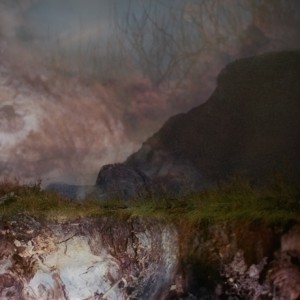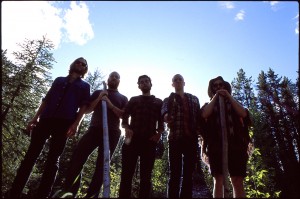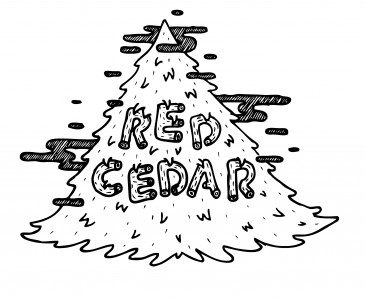Standing in front of the formerly titled “Red Cedar House” off of Oak Street, I feel like an audience in front of a stage. Once home to four of five members of local psych/indie/folk band Red Cedar, many a passerby has paused in front of this residence to hear free tunes float out into the surrounding neighbourhood.
Inside there is an overwhelming dimness; the walls are host to dark wood panels and some of the doorways are rounded, adding a subtle curve of character. Sitting in the living room among the company of a Miles Davis poster and an ancient built in wall-bar, I am introduced to Colin Jones (drums, keyboard), JP Doucet (electric guitar, vocals), and Shaunn Watt (bass, acoustic guitar, vocals). Unfortunately, the other two band members, Andy Bishop and Bruce Ledingham are absent. Hanging out together for the hundredth time in this exceptionally malleable space, now only Jones and Doucet call it home. Red Cedar‘s end, like so much of its musical evolution, now seems evident in the house’s roommate composition. It appears the band has a timeline with an address.

Officially broken up in January, Red Cedar has one final album for their fans. Mysteriously titled PFSF, it was released exclusively online on March 15 as a free download on their website. Considerably less folk influenced than their previous album, Enter the Sun Gods, the guys reflected on how their sound has evolved out of a certain community of musical influence.
Watt explains, “When we started out, there were a lot of bands we played with. There was a sound, but now those bands are mostly gone. This record is a by-product of moving beyond that.” Indeed Watt, Doucet and Jones seem insistent that this album moves them far from where they began; that the songs on PFSF are not direct impressions of the sound they were once immersed in, but rather are formations of newer influences and projects. The result is at once, unique, deliberate, and as Watt adds, “a bit more abstract.”
Beyond that, the album is more of a band record. Whereas on Enter the Sun Gods, Bishop wrote most of the songs, PFSF is a collaborative effort between everyone; it’s a personal production, with shared creative control. Best articulating this sentiment, Doucet adds, “there are no songs I don’t like.” Jones and Watt verify their solidarity with a nod.
After listening to the record multiple times I understand their approval and agree with it, but PFSF is a musical feat handed to listeners after a gesturing wave. And with this goodbye in mind, I ask the three why Red Cedar has come to an end. Watt replies immediately and sincerely that the band had reached “its inevitable conclusion.” And considering that PFSF moves Red Cedar far from its folk beginnings, it seems rational to assume that such fundamental change might apply to more than just the music.
By definition, bands are multi-dimensional creatures; even when calmed by collaboration. In this case, a natural drifting took place, where the weight of time and unsettled ambition pushed everyone off the same page. And this separation is nothing if not natural; especially as Watt says, “for five young men over a five year span.” Adding wisely that such a permanent creative focus would be , “difficult in any social setting.” True, all the guys have lives outside of this band, jobs and relationships. Where once Red Cedar brought them all together, it is now a point from which they can depart. And as I consider this division, Doucet adds some much needed perspective with the comment, “and that’s cool too.”

So it seems like a mature separation and interestingly, somehow even detectable in their latest album. Not in an intentional or explicit way, but rather in the style on PFSF; the album is psych-rock at its best. It’s comprised of several incredibly multi-dimensional songs. Each track (except maybe “Draught of the Land”) is thickly layered with instrumentals; at times, everyone performing boldly all at once. It’s definitive and powerful, especially when the vocals converge; some of the most pronounced examples being the chorus in “Ragged Voice” and “Coming Around to See the Light.”
To appreciate this sonic structure though, is also to acknowledge that each musician adds a unique element to each song, and just as everyone sounds great together, you know each part could also stand alone. It’s not always an exercise in taking turns, but the vastness of the sound in PFSF that makes the album so rich and impressive. It holds the kind of passion that fans can be assured will be taken with each member as he embarks on other musical projects.
And they have already divided into new projects, which they were eager to discuss. Bishop’s main project, White Ash Falls, is already active in the Vancouver music scene and has included rotating members of Yukon Blonde. Ledingham’s new project is yet to be named and Watt has a solo album out (free to download at shaunnwatt.com) and drums in quickly rising Siskiyou. Jones and Doucet have a project called Hierarchies (hierarchies.bandcamp.com) and Jones also drums in garage/indie band Hallow Moon.
Ending the interview I got a sense that all the guys were inspired and busy, plunging back into Vancouver’s local music community. As significant as Red Cedar’s break up has been for all involved, it shouldn’t really be reduced to a finite event. It is a natural change, with the musicians still active, but in new forms.
With this in mind, before heading out I mention to Doucet that they should update the note on their front door instructing against junk mail delivery, as it’s still signed “Red Cedar House.” He admitted it hadn’t been working well, and seemed pessimistic that an updated title would help.


